8 Things That Make Losing Weight Easier After 50

Navigating weight loss after 50 can feel like trying to solve a puzzle. As your body undergoes natural changes with age, the tried-and-true methods from your younger years often don't yield the same results. Fortunately, we're here to offer a fresh new perspective: With age, you gain a deeper understanding of your body, metabolism, and unique needs. This combination of knowledge and experience can be harnessed to make weight loss more attainable and sustainable as you age. We chatted with the experts who share some of the best things that make losing weight easier after 50.
Besides helping you feel and look better, maintaining a healthy weight is essential to graceful aging. For instance, being overweight or obese spikes your risk of developing several health conditions, including heart disease, high blood pressure, type 2 diabetes, and certain cancers.
Here, we spoke with nutrition and fitness experts who weigh in on eight things you can do to make losing weight easier after hitting the big 5-0. However, remember there's no quick fix or magic solution to weight loss. Only healthy lifestyle habits that you can build and sustain over the long term so you can have more energy to enjoy life.
Keep reading to uncover these eight essential habits for losing weight easily after 50, then check out these 10 Best Superfood Snacks to Strip Away Belly Fat.
Eat more protein.
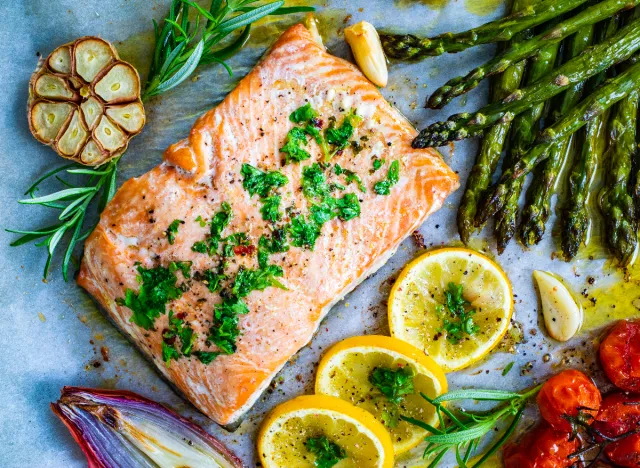
Protein isn't just the building block for muscles; it also plays a critical role in keeping you satiated and maintaining lean body mass. Muscle retention becomes even more essential as you age, helping boost metabolism and prevent sarcopenia (age-related muscle loss).
Brittany Lubeck, RD, a registered dietitian and nutrition writer, tells ETNT, "Protein is important throughout your life, but you need even more of this macronutrient as you age. After 50, you may start to lose muscle (an unfortunate part of aging), but this may be thwarted by eating more protein. To meet your protein goals, include it at every meal and snack."
Find an exercise routine you love.

You're much more likely to stick to a workout if you enjoy it. Whether walking, jogging, resistance training, dancing, yoga, or hiking, finding that sweet spot between physical activity and fun can revolutionize your weight loss journey. Additionally, research shows that older adults who exercised regularly experienced better mental health and cognitive function.
"Physical activity remains vital as you age, and it's important that you enjoy how you move your body," says Lubeck. "The more you like your exercise routine, the more likely you are to do it. You don't need to complete a high-intensity workout to reap the benefits. A combination of stretching, endurance exercise, and strength training is recommended for health after 50."
Prioritize high-quality sleep.

Sleep quality can be as vital as nutrition when aiming for weight loss, especially after 50. A rejuvenating night's rest can't be emphasized enough. According to a study published in Nature and Science of Sleep, quality sleep supports hormone regulation, directly impacting appetite and stress levels.
"At any age, a healthy sleep schedule will make losing weight easier," says Kate Meier, CPT, a certified personal trainer with Garage Gym Reviews. "Sleep not only makes you feel more energetic but also helps with muscle recovery after exercise and keeps your metabolism working at a healthy rate. A lack of sleep can also affect the hormones that control stress and the hormones that regulate your appetite, so make sure to get about seven to nine hours per night."
Follow a consistent eating schedule.
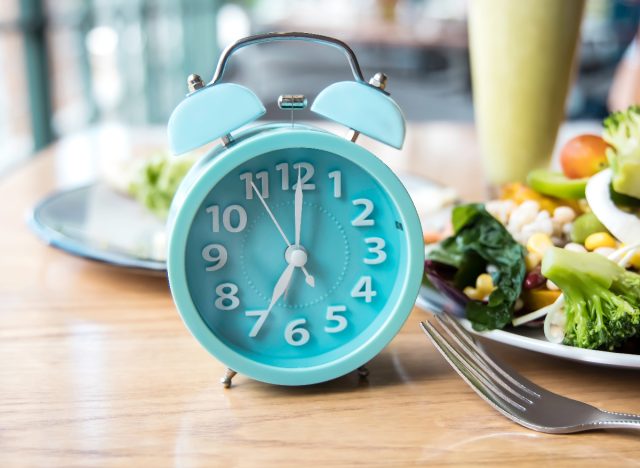
There's something to be said about the power of routine, especially when it comes to eating.
"Sticking to a consistent meal schedule can help weight loss by keeping your metabolism consistent," explains Meier. "This means your body will keep burning calories rather than slow your metabolic rate, which happens when your body tries to save energy if you haven't eaten in a while. Eating at regular intervals also helps prevent blood sugar drops and spikes, which can lead to cravings or dips in energy. If your schedule is busy, this may mean keeping healthy snacks on hand to ensure you don't go too long without eating."
Increase your fiber intake.
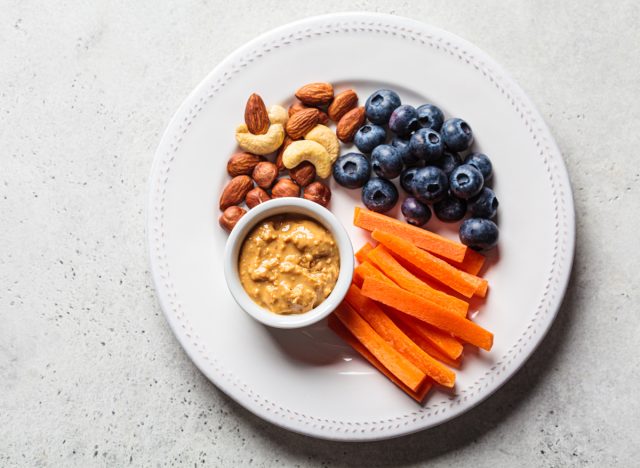
A 2023 study published in Frontiers in Nutrition concluded that foods rich in fiber, like whole grains, legumes, seeds, fruits, and vegetables, can keep you fuller for longer, helping curb cravings and support healthy weight management.
"With age comes increased risks of diabetes, heart disease, and other health conditions. Eating enough fiber daily can reduce your risk of these conditions and even improve digestion," says Lubeck.
Consult a health professional.

A tailored approach often reaps the best results. Meeting with a nutrition expert can provide insights unique to your body, lifestyle, and goals.
"When trying to lose weight, consulting your doctor, a registered dietitian, or a personal trainer can help you figure out the best approach for your specific case," says Meier. "This can take the guesswork out of your fitness or nutrition plan and allow you to focus on simply executing a strategy. Working with a healthcare or fitness professional can also help with accountability because they will check your progress."
Don't stress over the number on the scale.
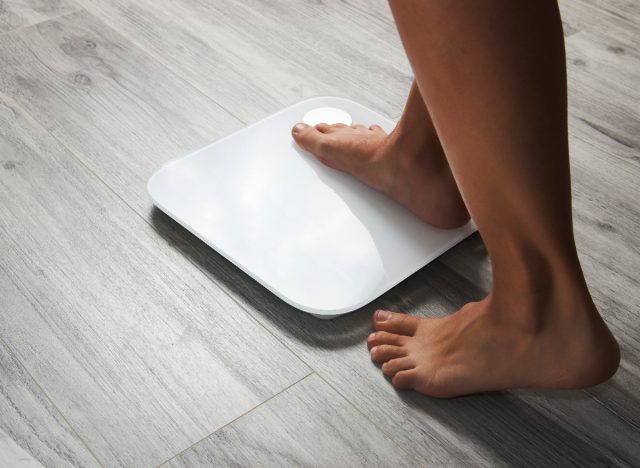
Weight can fluctuate daily due to water retention, muscle gain, and numerous other factors. So instead of fixating on what the scale says, look at other health indicators, like your energy levels, mental well-being, and waist size.
"Scales are the only way to know how much you weigh, but the number displayed when you step on one isn't necessarily a determinant of your overall health," explains Lubeck. "If you ramp up your workout routine, your body may convert some of its fat mass to muscle mass, which won't be reflected on a scale. In the end, nothing beats feeling healthy or having a clean bill of health from your healthcare provider."
Drink plenty of water.
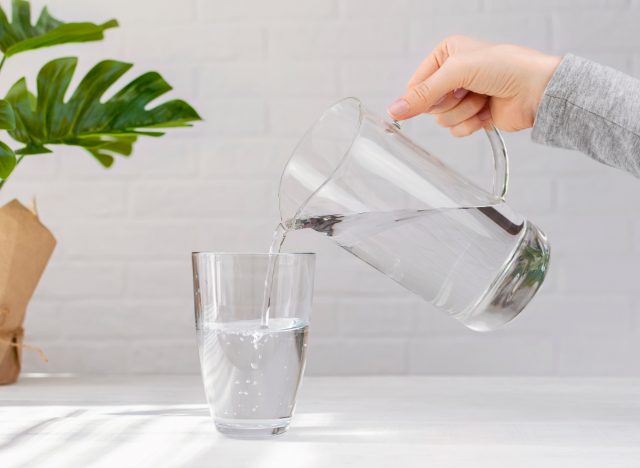
Beyond quenching your thirst, water plays a critical role in several bodily functions. Plus, staying hydrated can help you shed those extra pounds. Research reveals that drinking water before meals increases satiety, helping reduce the amount you eat and overall calorie intake.
"As a general rule, aiming for about half an ounce to an ounce of water per pound of body weight daily will ensure you're properly hydrated. Staying hydrated throughout the day can also help curb overeating, and it's an important part of healthy digestion, so you'll likely find you don't feel as hungry when you're sufficiently hydrated," says Meier.









